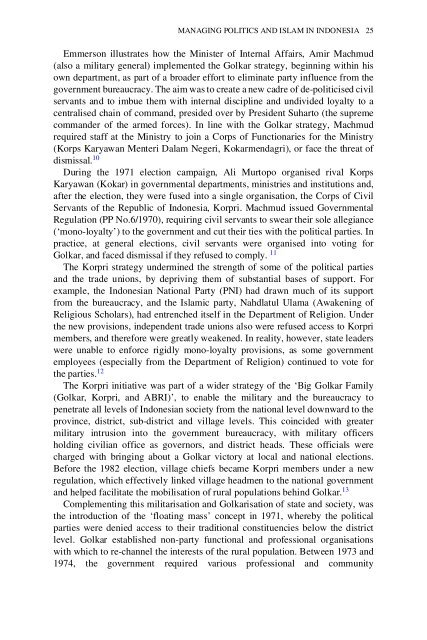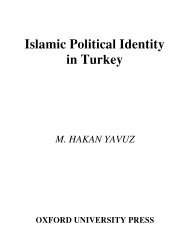Create successful ePaper yourself
Turn your PDF publications into a flip-book with our unique Google optimized e-Paper software.
MANAGING POLITICS AND ISLAM IN INDONESIA 25Emmerson illustrates how the M<strong>in</strong>ister of Internal Affairs, Amir Machmud(also a military general) implemented the Golkar strategy, beg<strong>in</strong>n<strong>in</strong>g with<strong>in</strong> hisown department, as part of a broader effort to elim<strong>in</strong>ate party <strong>in</strong>fluence from thegovernment bureaucracy. The aim was to create a new cadre of de-politicised civilservants <strong>and</strong> to imbue them with <strong>in</strong>ternal discipl<strong>in</strong>e <strong>and</strong> undivided loyalty to acentralised cha<strong>in</strong> of comm<strong>and</strong>, presided over by President Suharto (the supremecomm<strong>and</strong>er of the armed forces). In l<strong>in</strong>e with the Golkar strategy, Machmudrequired staff at the M<strong>in</strong>istry to jo<strong>in</strong> a Corps of Functionaries for the M<strong>in</strong>istry(Korps Karyawan Menteri Dalam Negeri, Kokarmendagri), or face the threat ofdismissal. 10Dur<strong>in</strong>g the 1971 election campaign, Ali Murtopo organised rival KorpsKaryawan (Kokar) <strong>in</strong> governmental departments, m<strong>in</strong>istries <strong>and</strong> <strong>in</strong>stitutions <strong>and</strong>,after the election, they were fused <strong>in</strong>to a s<strong>in</strong>gle organisation, the Corps of CivilServants of the Republic of <strong>Indonesia</strong>, Korpri. Machmud issued GovernmentalRegulation (PP No.6/1970), requir<strong>in</strong>g civil servants to swear their sole allegiance(‘mono-loyalty’) to the government <strong>and</strong> cut their ties with the political parties. Inpractice, at general elections, civil servants were organised <strong>in</strong>to vot<strong>in</strong>g forGolkar, <strong>and</strong> faced dismissal if they refused to comply. 11The Korpri strategy underm<strong>in</strong>ed the strength of some of the political parties<strong>and</strong> the trade unions, by depriv<strong>in</strong>g them of substantial bases of support. Forexample, the <strong>Indonesia</strong>n National Party (PNI) had drawn much of its supportfrom the bureaucracy, <strong>and</strong> the <strong>Islam</strong>ic party, Nahdlatul Ulama (Awaken<strong>in</strong>g ofReligious Scholars), had entrenched itself <strong>in</strong> the Department of Religion. Underthe new provisions, <strong>in</strong>dependent trade unions also were refused access to Korprimembers, <strong>and</strong> therefore were greatly weakened. In reality, however, state leaderswere unable to enforce rigidly mono-loyalty provisions, as some governmentemployees (especially from the Department of Religion) cont<strong>in</strong>ued to vote forthe parties. 12The Korpri <strong>in</strong>itiative was part of a wider strategy of the ‘Big Golkar Family(Golkar, Korpri, <strong>and</strong> ABRI)’, to enable the military <strong>and</strong> the bureaucracy topenetrate all levels of <strong>Indonesia</strong>n society from the national level downward to theprov<strong>in</strong>ce, district, sub-district <strong>and</strong> village levels. This co<strong>in</strong>cided with greatermilitary <strong>in</strong>trusion <strong>in</strong>to the government bureaucracy, with military officershold<strong>in</strong>g civilian office as governors, <strong>and</strong> district heads. These officials werecharged with br<strong>in</strong>g<strong>in</strong>g about a Golkar victory at local <strong>and</strong> national elections.Before the 1982 election, village chiefs became Korpri members under a newregulation, which effectively l<strong>in</strong>ked village headmen to the national government<strong>and</strong> helped facilitate the mobilisation of rural populations beh<strong>in</strong>d Golkar. 13Complement<strong>in</strong>g this militarisation <strong>and</strong> Golkarisation of state <strong>and</strong> society, wasthe <strong>in</strong>troduction of the ‘float<strong>in</strong>g mass’ concept <strong>in</strong> 1971, whereby the politicalparties were denied access to their traditional constituencies below the districtlevel. Golkar established non-party functional <strong>and</strong> professional organisationswith which to re-channel the <strong>in</strong>terests of the rural population. Between 1973 <strong>and</strong>1974, the government required various professional <strong>and</strong> community




